As families confront the tragedy of Tay Sachs, scientific advances in screening make a big difference
Before genetic screening was available, 40 to 50 babies with Tay Sachs were born in the United States every year. Most of them were born to Ashkenazi Jewish families, because about 1 in 30 Ashkenazi Jews are carriers of the Tay Sachs disease variant — that is about 10 times the rate found in the general population. A baby born with Tay Sachs appears healthy at birth, then begins a rapid decline, losing critical functions in the first few years and typically dying by the age of 4 or 5.
In a 2013 paper published in Human Genetics, geneticists Harry Ostrer and Karl Skorecki reported that more recently, due to the availability of genetic testing, approximately four to five cases of Tay Sachs disease occur in the United States annually. That’s a 10-fold decline.
This decline was a major victory, a testament to the success of genetic screening for that specific disease. The significant decline in Tay Sachs cases is due to awareness, education, and screening of Jewish singles and couples to identify carriers — people who have a single copy of the Tay Sachs gene. When two such carriers conceive a child, there is a 25% chance that their child will inherit two copies of the disease gene and suffer from that fatal neurological disorder. Screening and identification of carriers empowers couples, helping them avoid the heartbreak of losing a child, and giving them the opportunity to have healthy children.
Although the number of Tay Sachs babies born today is small, we might ask why Tay Sachs babies still are being born at all. That is because screening for a recessive gene, such as the Tay Sachs variant, does not eliminate it from the population. Recessive genes still are passed from generation to generation, and carriers abound. Anyone who is a carrier can pass the silent recessive gene to an unsuspecting descendant, with potential to be expressed in the future.
Tay Sachs is just one of dozens of known genetic diseases that occur
in higher incidence in the Jewish community. It is estimated that one in
three Jews carries a recessive gene for some genetic disease. For
genetic screening to work, it must be done universally, in every
generation, now and for the foreseeable future.
JScreen is an organization that addresses the need for testing; it offers a screening program that is comprehensive, affordable, and available throughout the United States. Its program fills a void – a need for reliable and accessible genetic screening throughout the country. JScreen sends out kits for collecting saliva; recipients mail them back. It also offers genetic counseling services that are available remotely, using such services as Telehealth.
JScreen’s executive director, Karen Grinzaid, has been a genetic counselor for more than 30 years. She said that the department of human genetics at Emory University’s medical school launched the JScreen program in 2013.
“There are two genetic testing panels, one for reproductive purposes, which tests for Tay Sachs, cystic fibrosis and other disease genes, and a separate panel of cancer susceptibility genes,” she said. The ReproGEN panel tests for more than 200 genes and the cancer panel now tests for 63 different genes, including those that show a hereditary risk for breast, ovarian, pancreatic, colon, skin and urinary tract cancers. Young people typically choose the reproductive panel, but some who are at higher risk for cancer also will screen with the cancer panel.
While genetic screening can flag genes of concern, the process is not perfect. Some cases of Tay Sachs disease have occurred because of human error, the result of mistakes in choosing tests and interpreting the results. JScreen’s testing program includes the services of a genetic counselor, whose assistance can reduce the incidence of errors. That is a critical component of a successful program since genetic counselors are experts who review, explain, and advise participants every step of the way. Genetic counseling helps to ensure that the correct tests are used, the reports and interpretations are accurate, and that options and choices are explained to the patients. The JScreen testing program also continues to update the repertoire of tests, staying current as new screenings become available.
Here are three stories about the experiences of families with Tay Sachs. Two are tragic, and one has a happy ending.
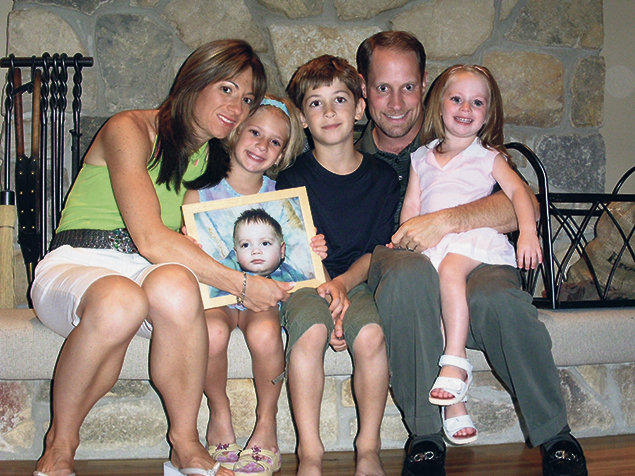
Shari and Jeffrey Ungerleider
Shari and Jeffrey Ungerleider of Wayne had a child who was born with Tay Sachs disease 28 years ago. As a result of that experience, Ms. Ungerleider is a strong advocate for JScreen.
“Evan was born August ‘94,” she said. “We thought he was born healthy and normal. I was tested for Tay Sachs and the doctor said, ‘You are not a carrier.’”
But “at 6 months old we noticed he wasn’t progressing,” she continued. “At 10 months the pediatrician recommended we see a pediatric neurologist.”
The doctors they consulted continued to test young Evan, trying to determine why he continued to regress.
“All the doctors we saw asked if we were tested for Tay Sachs, and when I said that I was, it was ruled out. At 13 months old, the pediatric ophthalmologist noticed the cherry red spot on the retina. ‘I know what that means. It means Tay Sachs,’ the neurologist said.
“This was the missing link to the puzzle,” Ms. Ungerleider said. The ob/gyn who initially tested the Ungerleiders looked at the records again and told them, “I misread your test. You are, in fact, a carrier of Tay Sachs.”
The saga of Evan’s short life included severe difficulties eating and swallowing; he needed a feeding tube. “He had seizures, bad respiratory problems, needed suction machines, physical therapy, respiratory therapy,” Ms. Ungerleider said. “He became blind and deaf, and he had to have full-time nursing care. He lived to almost 4 1/2 years old.”
The Ungerleiders have three other healthy children, who are now 25, 22, and 19 years old. “We chose to get pregnant naturally and get CVS testing,” Ms. Ungerleider said. CVS, or chorionic villus screening, is used to test the fetus for specific genetic sequences early in the pregnancy. One of Ms. Ungerleider’s pregnancies tested positive for Tay Sachs, and the couple chose to terminate it.
“Evan’s short life impacted all of us,” she said. “We had two goals: We made a lifetime of memories [of Evan] in a few short years, and we wanted to educate people on the importance that genetic testing of couples be done with genetic counseling.
“For the last 25 years I’ve been trying to educate people to get tested before they get pregnant. But mistakes still can be made. It still happens.”
Ms. Ungerleider was frustrated that although she spread the word about the need for screening, at the time “we did not have the appropriate resources. JScreen has been the best thing that could have happened in carrier screening. Now anyone can access it, and it’s so much more accessible and affordable.”
She recalled that they did screening in person, and as more genes were added to the panel, the costs became prohibitive. In the JScreen program the reproductive panel costs $149, and the cancer panel costs $199. “They’re a nonprofit,” she said. “They won’t let anyone walk away if they can’t afford it.”
Current recommendations are that everyone should have carrier screening. “Because carriers are healthy individuals, you don’t know [if you are a carrier] until you are tested or someone with the disease is born into the family,” Ms. Ungerleider said. “It’s important to have an organization like JScreen that can reach everyone in this country so they can be screened and educated. The counselors can also emphasize the importance of sharing [results] with other family members.”
Myra Sack and Matthew Goldstein
Myra Sack and Matthew Goldstein of Boston more recently suffered the loss of their child as the result of an error in genetic testing. Mistakes can happen in genetic screening, even to a couple with scientific and medical acumen. Dr. Goldman is an MD/Ph.D. who works at a biotechnology company; even his scientific expertise couldn’t protect him and his wife from a tragic human error.
“Before we got pregnant with Havi, we underwent preconception genetic screening,” Ms. Sack said. “I learned I was a carrier for Tay Sachs. Matt, my husband, was tested immediately. He had an enzyme test that came back positive, which indicated that he was likely a carrier.” Their genetic counselor recommended that Matt have full gene sequencing, which would search for every variant of the gene that could cause Tay Sachs disease. However, Ms. Sack reported, “The ordering physician ordered the wrong test, a test that only looked at five to seven common mutations. That came back negative, and we were told we were in the clear. We got pregnant a few months later with Havi.”
Havi was born seemingly healthy. “We only learned that an erroneous test was ordered when we saw developmental delays at around a year,” Ms. Sack said. “When the pediatrician noticed a startle reflex, one of the hallmark symptoms of Tay Sachs, he asked if we were tested, then advised retesting to confirm. Havi was born on September 4, 2018, our second anniversary.” Their baby girl, Havi, was diagnosed with Tay Sachs in December 2019 and died in January 2021.
By the time Havi was diagnosed, Ms. Sack was pregnant with her second child, Kaia. She was able to do a CVS genetic test and learned, to their relief, that Kaia was not affected. Myra Sack and Matthew Goldstein had their third child, Ezra, in August 2022.
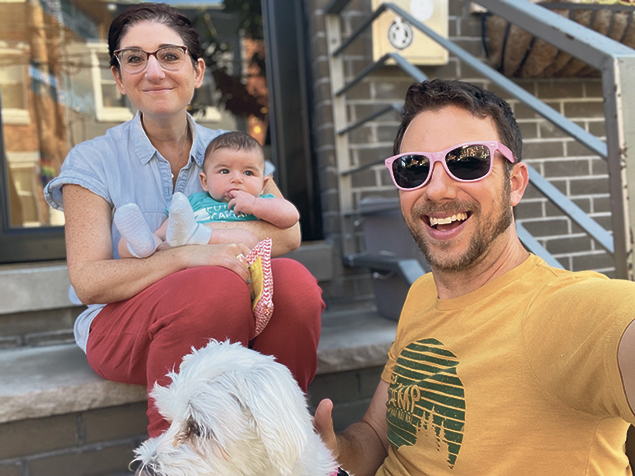
Andrew Davies and Molly Wernick
When Andrew Davies and Molly Wernick of Philadelphia learned they both were carriers of Tay Sachs disease, they were well equipped to deal with the challenge. “She found out a long time ago, and I found out about eight years ago, when I met a JScreen person and felt I should get tested,” Mr. Davies said. “The first step all couples should take is getting screened with JScreen. That information gives you risks and options.
“We decided to do IVF” — that’s in vitro fertilization — “and test the embryos,” he continued. “We went through the IVF process in 2019 and got several embryos that were Tay Sachs negative and several that were carriers but did not have Tay Sachs.”
In the IVF procedure, eggs and sperm from a couple are mixed in a petri dish in a clinical lab. The fertilized eggs are sustained in the lab, and develop into early embryos, which can be tested individually for many types of genetic defects by PGD — preimplantation genetic diagnosis. Tay Sachs-positive embryos, which have two copies of the Tay Sachs gene, are not used to establish a pregnancy. Embryos that have no Tay Sachs genes are used preferentially. Embryos with one copy of the Tay Sachs gene, which will produce children who are carriers but will not have the disease, can be considered for use.
“It took three times to work,” Mr. Davies said; referring to the transfer of three of their precious embryos into Ms. Wernick’s uterus. When their son Miller was born, “we called him ‘‘the charm,’ as in third time’s the charm.’
“We got about ten embryos,” Mr. Davies continued. “We used three that were negative for Tay Sachs. Three more that are still left are carriers. They are still frozen.
“It’s very expensive, about $30,000. We got help from our family and a small grant from a Jewish organization,” Mr. Davies said; most health insurance plans do not cover the costs of IVF, he added.
The couple is very involved in the prochoice movement. “All families should have the options that we do,” Mr. Davies said. “We’re afraid that procedures like IVF won’t be available for all. It’s a political and judicial decision, but really affects so many people’s personal lives.” He said that the Supreme Court’s decision in Dobbs, repealing Roe v. Wade, will interfere with many families’ access to the choices they might need. There are many cases where women’s lives are at stake, he said. “My sister-in-law had an ectopic pregnancy,” If left untreated, the ectopic pregnancy “would kill my family member.”
“Andrew and I are Jewish professionals dedicated to spreading the message of importance about genetic testing,” Ms. Wernick said. She works for Repair the World, a national Jewish nonprofit service-learning organization.
Ms. Wernick talked about the urgency of a woman’s right to choose. “It’s wild to think that we would be forced to choose between terminating a pregnancy at four months, and having a Tay Sachs baby and watching that infant child die,” she said. “That we would be denied that choice and be forced to do the latter is deeply disturbing.”
She said that her husband, whose unusual professional title is Chief Improvising Officer of the Bible Players, a Jewish comedy team in Philadelphia and New York City, and is a member of CharacTours, an Interactive theatrical acting group, has made videos to promote JScreen’s services. The amusing scripts encourage young people to keep genetic testing in mind as a priority. One such video is a parody of “The Bachelor,” called “The Beshert.” Instead of getting the rose at the end of the night, the man’s mother asks the girl if she would get JScreened.
Molly Wernick and Andrew Davies revel in their happy ending, a healthy baby boy. “IVF is quite a ride,” Ms. Wernick said. “Every early morning and progesterone shot was worth the joy we get from Miller every day. He’s just overwhelmingly joyous, and brings us an incredible amount of light.”
However, she emphasized, it is important to consider that these technologies are expensive, and they are not available to everyone. “We sit in a position of immense privilege for being able to afford in vitro,” she said. “For all the work JScreen does, it leads to the need for IVF. IVF is not covered by most insurance. It’s not available to those who don’t have the same economic access. And it’s not something that is accessible to all the people who need it.”
Molly Wernick’s message to the Jewish community is to focus on generating financial resources to support reproductive healthcare. “Why is there such an emphasis on screening in the Jewish community, but so much less support for actually addressing reproductive healthcare we need?” she asked. Many couples who discover that they are carriers for serious genetic diseases need IVF to have healthy children. “This is also true for same sex couples, and for people who need surrogates,” she said. “Fertility is wildly under-supported, and it is needed for helping Jewish continuity.
“In Israel there is infinitely better access to universal healthcare and reproductive healthcare,” she continued. “It’s up to us Jewish professionals to put it on the radar.”
In 2008 the United States Senate voted to designate September as National Tay-Sachs Awareness month, raising awareness of the disease, and recommendations for testing.
There is information on JScreen programs and services at www.jscreen.org.
Dr. Miryam Z. Wahrman of Teaneck, professor of biology at William Paterson University, is the author of “The Hand Book: Surviving in a Germ-Filled World,” and “Brave New Judaism: When Science and Scripture Collide.” She was part of the Mount Sinai Medical School team that set up the first IVF program and produced the first test tube baby in New York State.



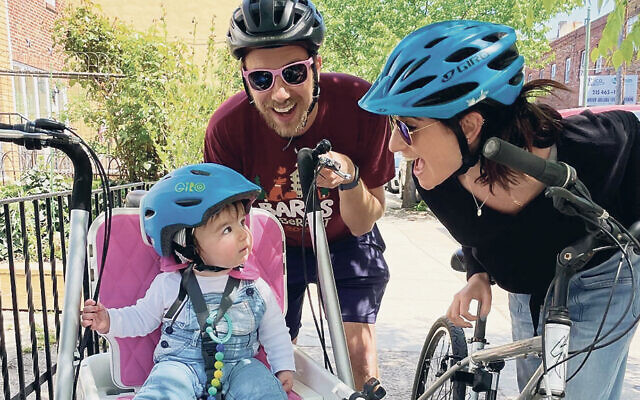
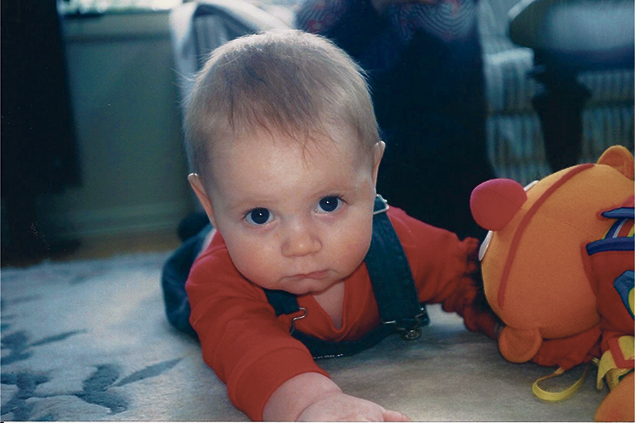
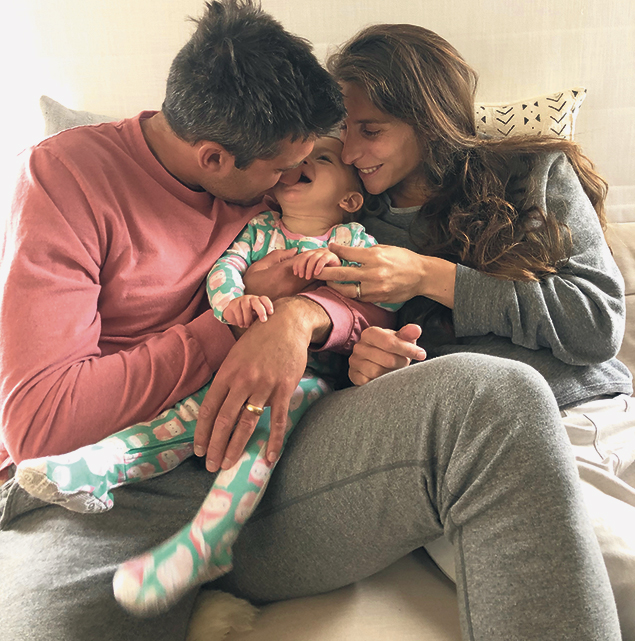

No comments:
Post a Comment